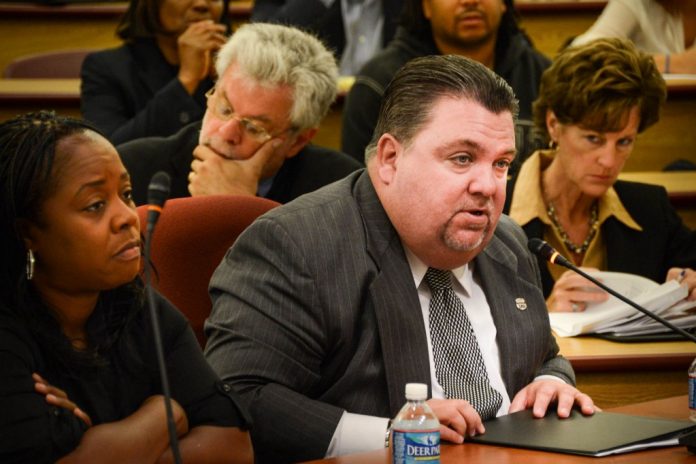FOP Lodge 5 president John McNesby (right) testifies at the hearing on parole procedures in the wake of the murder of police officer Moses Walker by a parolee. The hearing was held by Representative Brendan Boyle at MAST charter school. (Maria Pouchnikova)
State Rep. Brendan Boyle is happy that the Pennsylvania Board of Probation and Parole last Friday terminated three employees who were in charge of supervising the killer of Police Officer Moses Walker Jr.
At the same time, Boyle (D-170th dist.) wants the board to make its internal investigation public.
“I am heartened that the parole board’s internal investigation has at long last concluded and they have taken some action against those who apparently failed in this matter,” he said. “However, it is hard to draw full conclusions without seeing the investigation’s full findings.”
Boyle chaired a House Democratic Policy Committee public hearing on Oct. 23 at MaST Community Charter School.
Among those testifying were Michael C. Potteiger, chairman of the probation and parole board, and John McNesby, president of Fraternal Order of Police Lodge 5.
“If people had done their jobs,” McNesby testified, “we would not be here on this day.”
Walker’s mother, Wayne, and brother, Anthony, and their attorney, Michael F. Barrett, were in attendance.
Walker, 40, was shot to death shortly before 6 a.m. on Aug. 18 as he walked to a bus stop near 20th Street and Cecil B. Moore Avenue. A 19-year department veteran and church deacon, he had just finished a shift in the 22nd Police District. A video captured the killing.
The board did not arrange for murder suspect Rafael Jones to get the required electronic monitoring. Nor did it send him back to prison after he tested positive for drugs.
Jones, 23, has a long criminal record. A Common Pleas Court judge ordered the board to put him on electronic monitoring upon his release from prison on a gun charge on Aug. 8, adding that he should be sent back to jail if he failed a weekly drug test.
The monitoring was never set up. Jones tested positive for marijuana on Aug. 10 but was not rearrested. Eight days later, he allegedly shot Walker during a botched robbery.
Gov. Tom Corbett ordered an investigation.
The report was released on Friday, and Potteiger said in a statement that, “We are all saddened by the senseless death of Officer Walker.” He ordered the firing of three unnamed people, widely believed to be the parole agent and two of his supervisors.
“These employees were terminated due to violations of Board procedures, the Board’s Code of Conduct, and shortcomings in the manner in which Jones was supervised,” he said.
Barrett described the Walker family’s reaction to the terminations as “too little, too late.”
Potteiger indicated that the board is pursuing the option of using GPS technology, instead of an electronic monitoring system, to give parole agents a better tool for parolee management.
Boyle explained that his hearing had a two-fold purpose: to find out what went wrong in the Jones case and to reform the system so future tragedies do not take place.
“If we are to achieve the latter, then I reiterate my call for the parole board to make their findings public so that we can work together to prevent future failures in the parole system,” he said. “I can think of no greater tribute to Officer Walker than to fix a broken system that cost him his life. Let’s make this his lasting legacy.”
Between the time of the hearing and the release of the report, Walker’s family filed a federal lawsuit against the board. Potteiger, the parole officer and his supervisors were named in the suit.
Joining Boyle at the hearing were Reps. John Sabatina Jr., Kevin Boyle, Ed Neilson, Maria Donatucci, Ron Waters, Dom Costa, Scott Conklin, Pat Harkins and Joe Preston.
Boyle is still awaiting details of why a bracelet was not placed on Jones’ ankle and why he was not jailed after the positive drug test.
“Those two critical questions need to be answered,” he said. ••
Reporter Tom Waring can be reached at 215–354–3034 or [email protected]





